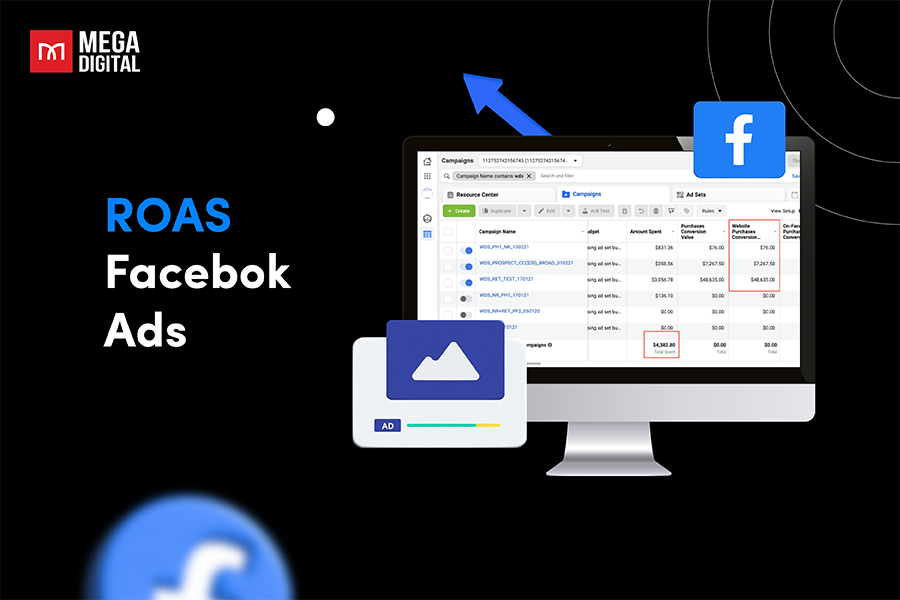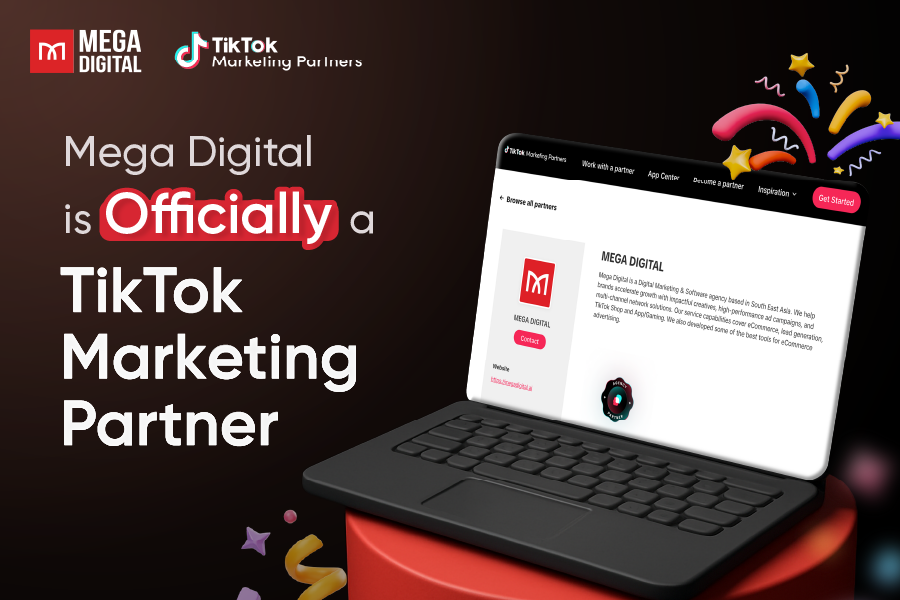Among the 3 keywords match types in Google Ads, phrase match is a feature that allows advertisers to target their ads to users who search for specific terms or phrases. It is often considered a balance approach between broad match and exact match. In this blog post, we will discover how phrase match Google Ads can elevate your advertising campaigns, as well as its best practices that you can use to do so.
- What is phrase match in Google Ads?
- Phrase match keywords example
- Benefits of Phrase match keywords in Google Ads
- Phrase match vs Broad match: What’s the difference?
- How to add Phrase match to your ad campaign?
- Best Practices for using Phrase match keywords in Google Ads
- Is Phrase match the best option for your ad campaigns?
What is phrase match in Google Ads?
Phrase match is one of the three keyword match types in Google Ads that allows advertisers to target their ads to show for searches that include the exact phrase they’ve specified or a close variation of that phrase.
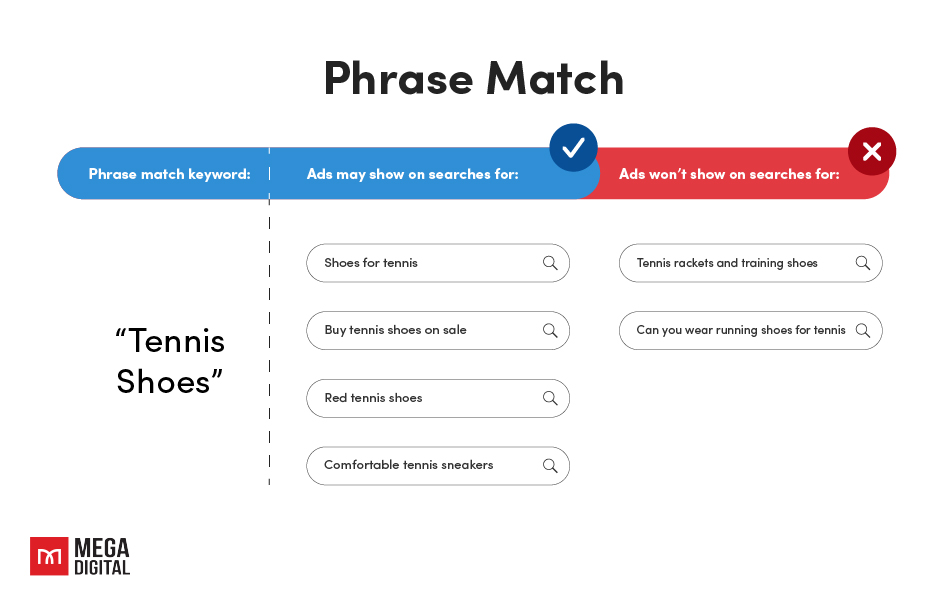
More specifically, phrase match makes your ad show up when people look for the exact words you’ve chosen, even if there are extra words before or after. It also works if someone searches for words that are very similar to your chosen ones, like misspellings, singular or plural forms, acronyms, and more. But, be careful with the word order. If someone adds an extra word in the middle of your keyword, your ad might not show up.
To specify a phrase match in Google Ads, you put the keyword in quotation marks.
Phrase match keywords example
For example, if your phrase match keyword is “tennis skirt”, you want your ad to show for searches containing the phrase “tennis skirt” or its close variants.
Let’s look at a few examples with explanations in this table:
| Search query | Will your ad show? | Reason |
|---|---|---|
| tennis skirt | Yes | The search query exactly matches your phrase |
| buy tennis skirt | Yes | The search query includes the exact phrase with an additional word before it |
| best tennis skirts | Yes | The search query includes the exact phrase with an additional word before it, plus the plural form is a close variant |
| tenis skrt | Yes | The word “skrt” is count as a close variant of misspelling. |
| tennis stylish skirt | No | An extra word is added in the middle of your keyword |
Benefits of Phrase match keywords in Google Ads
Using phrase match keywords for your Google Ads campaign offers several benefits. Here are the top 3:
Improved ad relevance
Ads triggered by phrase match keywords are more likely to be relevant to the user’s search query. This can increase the chances that your ad will be seen by people who are actually interested in what you have to offer.
Better targeting
Phrase match empowers you to dictate the precise phrasing that activates your ad, providing you with enhanced precision to target specific searches.
Increased click-through rate (CTR)
Phrase match can be cost-effective because it narrows down the audience to those specifically interested in the core phrase. This can result in higher click-through rates and potentially lower costs per click compared to broad match.
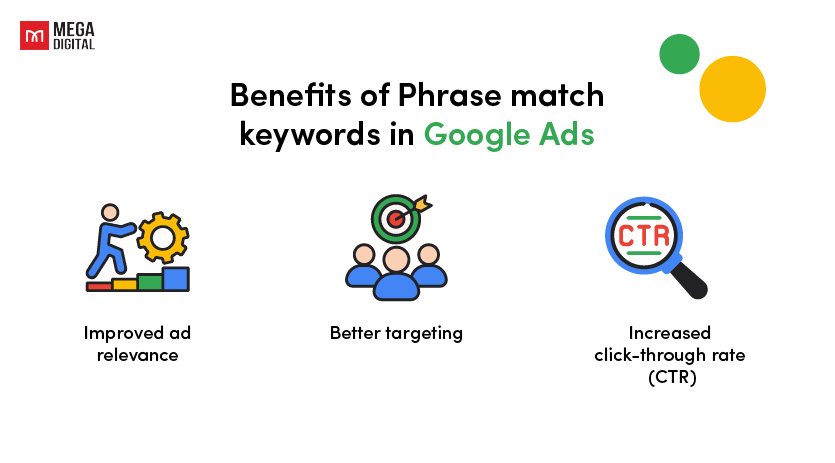
Phrase match vs Broad match: What’s the difference?
While both phrase match and broad match share the commonality of being keyword match types that allow for variations, they differ in terms of precision, control, and use cases. Here’s a table highlighting the differences between phrase match and broad match in Google Ads:
| Aspect | Phrase match | Broad match |
|---|---|---|
| Precision | Higher precision, targeting specific phrases and close variations | Less precision, capturing a broader range of variations and related searches |
| Control | More control over when ads are triggered | Less control over ad placements |
| Use cases | Suitable for a balance between reach and specificity, targeting users with specific phrases | Suitable for casting a wider net, discovering new keywords, and maximizing visibility |
| Adaptability | More adaptable for advertisers wanting a balance between the specificity of exact match and the reach of broad match | More adaptable for advertisers focused on exploration, discovery, and maximizing exposure to a diverse audience |
How to add Phrase match to your ad campaign?
Applying phrase match keywords in your Google Ads campaigns is a straightforward process. Here’s a step-by-step guide on how to do it:s
Step 1: Create or select the campaign you want to edit
First, log in to your Google Ads account at https://ads.google.com. If you don’t have one, you’ll need to create an account.
Click on the “Campaigns” tab to access the dashboard where you manage your ad campaigns. Choose the campaign to which you want to add the phrase match keyword. If you don’t have a campaign set up, you may need to create one.
Step 2: Click on the “+” button to add a keyword
Once you’re in the campaign, look for the “+” or “Add” button, usually located in the “Keywords” tab. Click on it to add a new keyword.
Step 3: Choose “Phrase match” option
In the keyword entry field, you’ll have the option to select the match type. Choose “Phrase match” from the dropdown menu.
Step 4: Enter your keyword
Type in the specific keyword or phrase you want to target with phrase match. Enter the bid amount for your keyword.
Best Practices for using Phrase match keywords in Google Ads
Phrase match can be a great way to maintain a balance between relevant and precise targeting, but it’s important to use it carefully and wisely as well. To help you achieve that, here are some tips from Mega Digital for using phrase match effectively:
Choose relevant phrases
Select phrases that are closely related to your product or service. Think about the common ways people might search for what you offer. Use relevant phrases that capture the intent of potential customers and align with your advertising goals.
Use negative keywords
Filter out irrelevant traffic that might “trigger” your unnecessary ad cost. You should regularly review search terms reports and add negative keywords to exclude terms that aren’t relevant to your campaign. For example, if you sell running shoes, you could add “basketball shoes” as a negative keyword to prevent your ad from showing for searches related to basketball shoes.
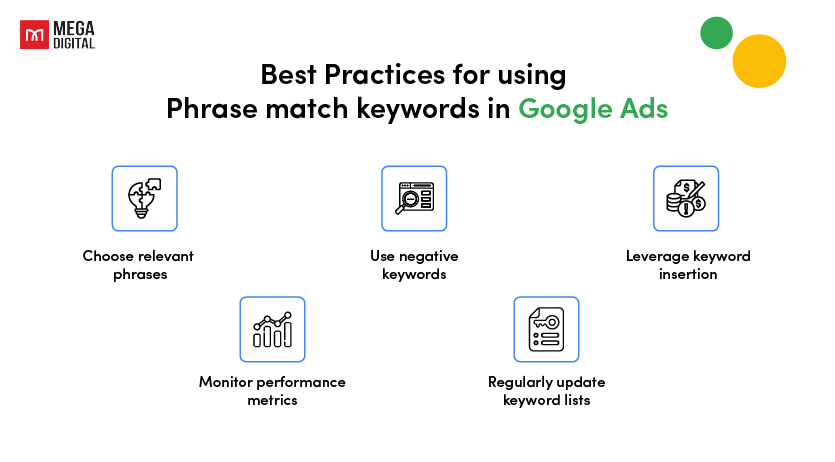
Leverage keyword insertion
Use keyword insertion in ad copy to make your ads more dynamic and relevant to the user’s search query. Ensure that inserted keywords fit naturally within the ad copy for a seamless user experience.
Monitor performance metrics
Regularly track key performance metrics and modify your campaigns if needed. You should keep a close eye on your click-through rate (CTR) and cost-per-click (CPC) to assess the performance of your ads. If you observe a low CTR or a high CPC, consider making adjustments to your keyword match types for optimization.
Regularly update keyword lists
Keep your keyword lists up-to-date by removing underperforming keywords and adding new relevant phrases as needed. Stay informed about industry trends and changes in user behavior to adapt your keyword strategy accordingly.
Is Phrase match the best option for your ad campaigns?
It is true that phrase match strikes a balance between the broad reach of broad match and the precision of exact match, making it a popular choice for advertisers aiming to capture a relevant yet diverse audience. But this type of keyword match is nowhere near the perfect choice that works for every advertising campaign. There are some specific situations where you should really consider using other keywords match types:
- Exploratory campaigns: In the initial stages of a campaign where you are still exploring and discovering new keywords, broad match might help uncover unexpected opportunities.
- Very broad audience targeting: If your goal is to reach a wider audience than what phrase match can provide, broad match might be more suitable.
- Highly specific targeting: If you know your customers well and need extremely precise targeting to make your ads show only for the exact words they search for, then exact match might be more appropriate.
Many advertisers find success in using a combination of two or more keyword match types within their campaigns. We recommend you do so to extend your reach to a wider audience while maintaining control over the visibility of your ad.
Wrap-up
Learning how to use phrase match helps advertisers find the perfect balance between reaching lots of people and being super specific. So, in your next ad campaign, use what you’ve learned here to make your ads connect with the right people at the right time.







